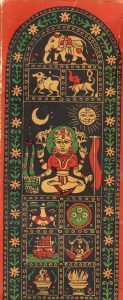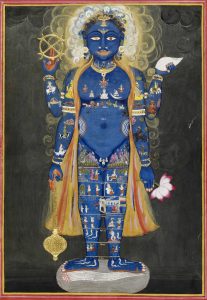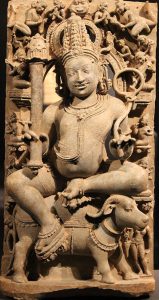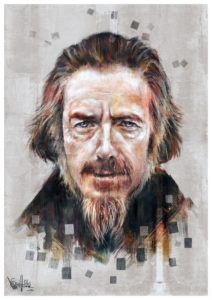Tag: Vedanta
-

An illustration of the Mandala-brahmana Upanishad, in which the god Narayana, a form of Vishnu, teaches yoga to Yajnavalkya.
3,744 words
Part I here, Part II here, Part III here
The Brihadaranyaka Upanishad is quite long, and we can only scratch the surface here. In truth, even the shortest of the Upanishads could justify a long commentary. The texts of Vedanta are a whole, each of the parts of which reflects the whole in miniature. In other words, within each text one may find the whole teaching. This does not mean, of course, that the whole teaching is explicitly stated. Rather, one will find that to truly understand the full significance of any one statement in the Upanishads, we must situate it within the context of the entire teaching.
“Brihadaranyaka” means “of the great forest.” Aranyaka means “of the forest” or “of the wilderness.” The Aranyakas are understood to be a type of ancient Hindu literature, along with the Samhitas, the Brahmanas, and the Upanishads. (more…)
-
4,644 words
Part I here, Part II here, Part IV here
In the last installment of this series, we saw that the Katha Upanishad tells the story of Nachiketa, a boy who is tutored by Yama, the god of death. The boy makes a request of Yama, which at first the god does not want to grant: “When a person dies, there arises this doubt: ‘he still exists,’ say some, ‘he does not’ say others. I want you to teach me the truth.” But Yama soon realizes that Nachiketa is a worthy student, and begins to teach. (more…)
-
4,058 words
Part I here, Part III here, Part IV here
The Katha Upanishad tells the story of a boy named Nachiketa whose father, Vajasravasa, decides to curry the favor of the gods by giving away his possessions. However, it seems that he was rather selective in what he gave up, only parting with things that were now useless to him. Nachiketa, who is quite pious, sees through his father’s insincerity: “What merit is there,” the boy asks, “in giving away cows that are too old to give milk?” This question, from a mere child, wounds Vajasravasa’s pride. Foolishly, Nachiketa persists: “To whom will you offer me?” he asks. Vajasravasa ignores the question at first, but when Nachiketa repeats it his father answers angrily, “To death I give you!” (more…)
-

Lord Vishnu as Vishvarupa, illustrating the three realms: heaven (head to belly), earth (groin), and underworld (legs). Painting c. 1800-50, Jaipur.
2,774 words
Part II here, Part III here, Part IV here
In this series of self-contained essays, I will offer an introduction to Vedanta, the philosophy of the Upanishads, through brief commentaries on individual Upanishads. These essays are geared toward individuals drawn to the path of Traditionalism – and especially the Left-Hand Path of Evolian Traditionalism.They place Vedanta in the context of Tradition. Further, they make clear the relevance of this path for those of us who are not just in revolt against the modern world, but who wish to live the ideal of “self-overcoming” – an ideal for all ages. (more…)
-
Part 2 of 2. Part 1 here.
Partings II – Watts and The Church Today: Real Presence or Real Estate?
Watts was quite successful in his attempt to express the religio perennis in the language of Christian theology; not just in my opinion today, but among his Episcopal peers at the time (one bishop even called it “the most important book on religion in this century”[1]), (more…)
-
Part 1 of 2
Alan W. Watts
Behold the Spirit: A Study in the Necessity of Mystical Religion
New York: Pantheon, 1947; reissued with a new Preface, 1971
Kindle, 2016“For God is not niggardly in his self-revelation; he exposes himself right before our eyes.” — Alan Watts (more…)
-
Alan Watts–Here and Now: Contributions to Psychology, Philosophy, and Religion
Ed. Peter J. Columbus and Donadrian L. Rice
Albany, NY: SUNY Press, 2012“It is the peculiar nature of my adolescent explorings of the Devon countryside . . . that made me what I am—and in many other ways besides writing. . . . I have never gained any taste for what lies beyond the experience of solitary discovery. . . . (more…)
-
Alejandro Jodorowsky
The Spiritual Journey of Alejandro Jodorowsky
Rochester Vt.: Inner Traditions, 20081. Introduction
Alejandro Jodorowsky is known to English-speaking audiences as the director and star of the cult film El Topo (1970). His other films (of which there are only a few) are lesser known, and his work outside of film is hardly known at all in America. (more…)
-
English original here
Alan Watts
Does It Matter?: Essays on Man’s Relation to Materiality
New York: Vintage, 1971 -
April 10, 2013 Julius Evola
Vedanta, Meister Eckhart, Schelling
3,778 words
Translation anonymous, edited by Greg Johnson
Editor’s Note:
The following essay was originally published in English in East and West, vol. 9, nos. 2 & 3 (1960): 182–86. This is chapter 18 of Julius Evola, East and West: Comparative Studies in Pursuit of Tradition, ed. Greg Johnson, forthcoming from Counter-Currents in the summer of 2013.
-
Alan Watts is one of my favorite writers. Born in Chislehurst, Kent, England, Watts was raised an Anglican, but became a Buddhist at age 15. In 1941, while Watts was living in New York City, his first wife Eleanor had a mystical vision of Jesus. This led him to return to Anglicanism.










